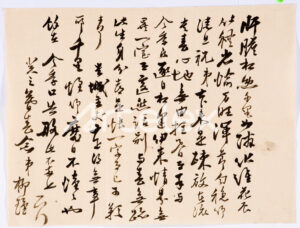Yu Geun (September 26, 1861 – May 20, 1921) was a Korean independence activist and journalist, posthumously awarded the Order of Merit for National Foundation by the South Korean government in 1962. Born in Yongin, Gyeonggi Province, he pursued Confucian studies in his early years before moving to Seoul in 1894. In 1895, he was appointed as a civil servant in the Ministry of Finance under Kim Hong-jip’s cabinet. However, following the assassination of Kim Hong-jip and other officials after the 1896 Eulmi Incident, Yu resigned from his position in March of that year.
In 1896, Yu joined the Independence Club and actively participated in its enlightenment efforts through various discussions aimed at protecting national sovereignty and promoting civil rights. After the club was disbanded, he was arrested and endured hardship for his involvement.
In 1898, Yu co-founded the Hwangseong Newspaper along with Namgung Eok, Na Soo-yeon, and Jang Ji-yeon, serving as editor-in-chief and a leading columnist. He was also a teacher at Whimoon High School, dedicating himself to the enlightenment movement. When the Eulsa Treaty was signed in 1905, which ceded Korea’s diplomatic rights to Japan, Yu fiercely criticized the treaty and denounced Japan’s aggression. It is said that when Jang Ji-yeon wrote his famous editorial, “I Cry Out in Great Anguish on This Day,” but was too overcome with emotion to complete it, Yu finished the latter part and ensured its distribution overnight. As a result, Jang Ji-yeon was arrested, and Hwangseong Newspaper was suspended indefinitely.
Following this, Yu continued his educational and enlightenment efforts at Whimoon High School and became the fifth president of Hwangseong Newspaper in 1907, holding the position until June 1910. During this time, he used the newspaper as a platform to foster national consciousness and promote the spirit of independence. He also co-authored the Revised History of Korea in 1906, aiming to educate the public on the history of the Korean people from the era of Dangun to Goryeo.
Yu was a founding member of the Korean Self-Strengthening Society, formed in 1906, and, after its dissolution, helped establish the Korean Association in 1907. He was also a member of the secret independence group, Shinminhoe, playing an active role in journalism, publishing, and education. He authored elementary history books, such as Elementary History of Korea (1908) and Newly Edited Elementary History (1910), to inspire historical and national awareness in students. In 1909, Yu joined Daejonggyo, a religious movement centered on Korean national identity, and continued to work as a missionary until his death.
In 1910, he participated in the establishment of the Korean Classics Preservation Society, led by Choe Nam-seon, which aimed to preserve and promote Korea’s classical literature and cultural heritage. He was involved in publishing works and compiling dictionaries, including New Dictionary alongside Yi In-seung. In 1915, Yu became the principal of Jungang School but was arrested in 1917 for his involvement in the secret organization, Korean Product Promotion Society, which led to his resignation.
After the March 1st Movement of 1919, Yu participated in the formation of the Provisional Government of Korea, serving as one of the 13 provincial representatives. He co-authored the National Assembly Manifesto, which outlined the goals and principles of the newly established government. However, due to Japanese repression, the government was short-lived, and Yu returned to journalism. In April 1920, he contributed to the founding of Dong-A Ilbo and served as editor alongside Yang Gi-tak. According to former Dong-A Ilbo journalist Yu Gwang-yeol, when asked for a name for the new newspaper, Yu Geun suggested, “We must view all of East Asia as our stage in the future. Therefore, let’s name it Dong-A Ilbo (East Asia Daily).”
In the first edition of Dong-A Ilbo, Yu wrote a manifesto titled “The Duties and Responsibilities of Our Newspaper,” emphasizing its role as a voice for the Korean people and a defender of their rights, education, and culture.
Yu Geun passed away on May 20, 1921, in Seoul at the age of 60. In his final moments, he left behind the following words: “Abolish factionalism. It is a chronic illness of the Korean people, and those who work for society and the nation must strive to eradicate it.”
In recognition of his contributions to Korea’s independence, Yu Geun was posthumously awarded the Order of Merit for National Foundation in 1962.

